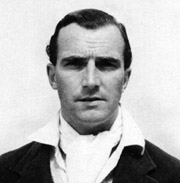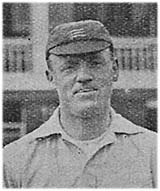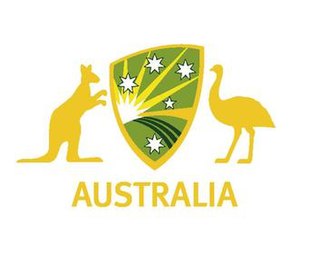Sources
- Jack Webster at CricketArchive (subscription required)
- Jack Webster at ESPNcricinfo
- Playfair Cricket Annual – 1948 edition
Jack Webster (1917-1997) was an English cricketer active from 1938 to 1956 who played for Cambridge University immediately before the Second World War. He joined Northamptonshire after the war and played occasionally for them from 1946 to 1955. He appeared in 71 first-class matches as a right arm medium fast bowler who was a righthanded batsman. Webster was born in Tyersal, Bradford on 28 October 1917 and died in Guiting Power, Gloucestershire on 25 October 1997, three days short of his 80th birthday. He took 145 first-class wickets with a best performance of seven for 78 and he scored 617 runs with a highest score of 65, one of two half-centuries. [1]

Lancashire County Cricket Club represents the historic county of Lancashire in English cricket. The club has held first-class status since it was founded in 1864. Lancashire's home is Old Trafford Cricket Ground, although the team also play matches at other grounds around the county. Lancashire was a founder member of the County Championship in 1890 and have won the competition nine times, most recently in 2011. The club's limited overs team is called Lancashire Lightning.

Middlesex County Cricket Club is one of eighteen first-class county clubs within the domestic cricket structure of England and Wales. It represents the historic county of Middlesex which has effectively been subsumed within the ceremonial county of Greater London. The club was founded in 1864 but teams representing the county have played top-class cricket since the early 18th century and the club has always held first-class status. Middlesex have competed in the County Championship since the official start of the competition in 1890 and have played in every top-level domestic cricket competition in England.

Kenneth Cranston was an English amateur cricketer, who played first-class cricket for Lancashire and eight times for England, in 1947 and 1948. He retired from playing cricket to concentrate on his career as a dentist.

Essex County Cricket Club is one of eighteen first-class county clubs within the domestic cricket structure of England and Wales. It represents the historic county of Essex. Founded in 1876, the club had minor county status until 1894 when it was promoted to first-class status pending its entry into the County Championship in 1895, since then the team has played in every top-level domestic cricket competition in England. Essex currently play all their home games at the County Cricket Ground, Chelmsford. The club has formerly used other venues throughout the county including Lower Castle Park in Colchester, Valentines Park in Ilford, Leyton Cricket Ground, the Gidea Park Sports Ground in Romford, and Garon Park and Southchurch Park, both in Southend. Its limited overs team is called the Essex Eagles.

John David Benbow Robertson was an English cricketer, who played county cricket for Middlesex, and in eleven Tests for England.

John Brian Iverson, known as Jack Iverson, was an Australian cricketer who played in five Test matches from 1950 to 1951. He was known for his unique "bent finger" grip, with which he briefly perplexed batsmen across Australia as well as the touring English cricket team. His five Tests were all against England, in the 1950–51 series, but was forced to retire to look after his ailing father's business; he "could have the world's best batsmen at his mercy, if he could spare the time".

John William Gleeson was an Australian cricketer who played in 29 Tests from 1967 to 1972. He is best known for his unique bowling style, which according to Cricket Australia CEO James Sutherland "bamboozled batsmen" and could "regularly dumbfound the best batsmen in any team".

Henry William "Harry" Lee was a professional English cricketer who played first-class cricket for the Marylebone Cricket Club (MCC) and Middlesex County Cricket Club between 1911 and 1934. He made one Test appearance for England, in 1931. An all-rounder, Lee was a right-handed batsman and bowled both off break and slow-medium pace bowling with his right arm. He scored 1,000 runs in a season on thirteen occasions. Part of the County Championship winning sides in 1920 and 1921, Lee aggregated 20,158 runs and took 401 wickets in first-class cricket.
John Lindsay Bryan, known as Jack Bryan, was an English schoolteacher and cricketer who played for Cambridge University and Kent County Cricket Club. Bryan served in the British Army in both World War I and World War II and won the Military Cross in 1918.

When the First World War ended in November 1918, thousands of Australian servicemen were in Europe as members of the First Australian Imperial Force (AIF) and many remained until the spring of 1919. In England, a new first-class cricket season was planned, the first since 1914, and an idea that came to fruition was the formation of an Australian touring side made up of servicemen. Agreement was reached with the Australian Corps HQ in London, commanded by Field Marshal William Birdwood, 1st Baron Birdwood, and the Australian Imperial Force Touring XI was formed, initially under the captaincy of pre-war Test player Charlie Kelleway. Kelleway departed after only six matches following a dispute about the fixtures list. A players' meeting elected future Test player Herbie Collins as team captain for the remainder of the tour, despite the fact that Collins' military rank was lance corporal and there were seven officers in the party. The bulk of the team remained intact for nearly nine months from May 1919, playing 33 matches in Great Britain, ten in South Africa on their way home and then another three in Australia itself before disbanding in February 1920. Of the 46 matches, 39 are adjudged first-class and the team had only four defeats, all of these in England. The players lived on their army pay and all profits from gate money went to an AIF Sports Control Board.
1939 was the 46th season of County Championship cricket in England. It was the one and only season in which English cricket adopted the eight-ball over. It was the last season before the Second World War and it was not until 1946 that first-class cricket could resume in England on a normal basis. The West Indies were on tour and England won the Test series 1–0. The West Indian team departed early, with several matches cancelled, because of the growing international crisis. In the 1940 edition of Wisden Cricketers' Almanack, author R. C. Robertson-Glasgow reviewed the 1939 season and remarked that it was "like peeping through the wrong end of a telescope at a very small but happy world".
Cricket in World War I was severely curtailed in all nations where first-class cricket was then played except India. In England, South Africa and the West Indies, first-class cricket was entirely abandoned for the whole of the war, whilst in Australia and New Zealand regular competitions were played for the 1914–15 season but first-class matches were afterwards abandoned. In South Africa, first-class cricket did not recommence until a series of matches against the Australian Imperial Forces cricket team in late 1919, and provincial cricket was not played until a one-off match between Transvaal and Natal in April 1920.

John Richard Mason, known as Jack Mason, was an English amateur cricketer who played first-class cricket for Kent County Cricket Club between 1893 and 1914, captaining the team between 1898 and 1902. He played for England in five Test matches on A. E. Stoddart's 1897–98 tour of Australia.

Malcolm Douglas Lyon, generally known as Dar Lyon was an English first-class cricketer who played for Somerset County Cricket Club through the 1920s. He was a right-handed top order batsman known for his beautiful driving who occasionally captained and kept wicket for the county.

Jack Francis Lee Laver was a Tasmanian cricketer who played 13 matches of first class cricket for Tasmania between 1946 and 1952.
Major Stephen Richard St Leger Blakeney was an Irish cricketer who was born at Dublin.
Charles Henry Florence D'Arcy McCarthy was an English cricketer, born in Coimbatore which was then in the British Raj. McCarthy was a right-handed batsman who bowled leg break.
William Jack Malden, known as Jack Malden, was an English cricketer. Malden was a right-handed batsman. He played mainly for Sussex County Cricket Club.

Cricket Australia XI is a domestic cricket team who play tour matches against international teams touring Australia. The team formerly played in Australia's JLT Cup limited-overs tournament. Before each tournament, a 14-man squad was selected from young players with state contracts, or Australian National Performance Squad players, who had not been picked in their respective states' 14-man List A squads for that season's tournament. The aim was to develop their skills against top players.
Jack Mervyn Pritchard was an English first-class cricketer and British Army officer.